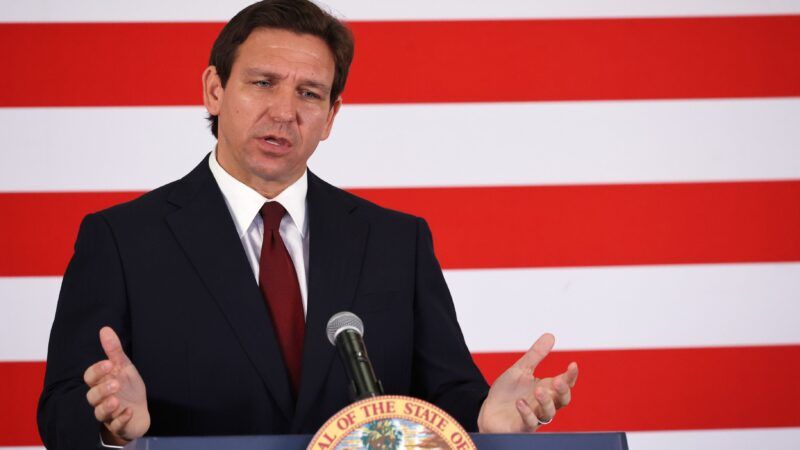Trump's Anti–First Amendment Skylarking Is DeSantis' Anti–First Amendment Action
The former president wanted to "open up" defamation laws. The governor of Florida is about to try.

Standing in front of a large American flag at an event touting civics education "on topics including rights and responsibilities of citizens…and also understanding the philosophical underpinnings of the American republic," Florida Gov. Ron DeSantis (R) made a case for abrogating press freedom.
He supports Florida House Bill 991, DeSantis explained, in its plan to make it easier to sue journalists for defamation, perhaps most controversially by changing the legal status of anonymous sourcing. "If somebody is defamed…if [the journalist is] using anonymous sources, that can be a presumption that that was done with malice," DeSantis said Thursday. "I think what's happened is particularly corporate media outlets have relied on anonymous sources to smear people."
But don't worry, H.B. 991's discouragement of anonymous sourcing isn't "going to cause much of a difference in terms of free speech," DeSantis added. It will merely "cause some people to not want to put out things that are false, that are smearing somebody's reputation."
Of course, it will also cause some people not to want to put out things that are true but unflattering to public figures like DeSantis—or, to point to the obvious case of anonymous sourcing proving correct, President Richard Nixon.
This bill isn't all bad, and there's a fair critique to be made of overreliance on anonymous sources where trivial matters are concerned. But, on balance, this legislation is an attack on the freedom of the press, and its support from DeSantis suggests that on an important constitutional matter, there's not much daylight between him and his presumptive presidential primary rival, former President Donald Trump.
H.B. 991 is in some regards reasonable. For instance, it provides that you don't become a public figure merely by giving an interview to the press; defending yourself "publicly against accusations;" being the subject of a viral video or photo; or holding "public employment other than elected office or appointment by an elected official."
In other words, being a teacher or DMV clerk doesn't make you a public figure. Nor does, say, becoming the "Central Park Karen" or the "ain't nobody got time for that" woman. In a defamation suit, H.B. 991 says that absent some other sort of fame—some willful entrance into public life, like cultivating celebrity or running for office—these people should be treated like private figures who enjoy a stronger standard of reputational protection.
I'm not sure this distinction is right exactly as written. Protection for people who give a man-on-the-street interview or unwillingly become viral memes makes sense, but police officers strike me as public employees who should be treated as public figures because of their unique role, which includes legally protected use of force. Some critics have also argued H.B. 991's delineation could violate Supreme Court precedent. Still, the underlying idea—of specifying what it means to be a public figure in a digital era where sudden, unsought notoriety is possible in a way it wasn't in the very recent past—seems fair.
It's also fair to say that sometimes the media goes overboard with anonymous sourcing. I've thought this myself, especially during the Trump administration, when comments from unnamed "people close to the president" were regularly the basis of high-profile but objectively low-stakes coverage of White House personal drama which mostly told us what we already knew: that Trump was petty, deceptive, and ill-equipped for his office. A story doesn't have to rise to the significance of Watergate to justify reliance on sources who won't consent to be named, but that hardly means every snippet of anonymous gossip deserves publication.
And yet, as ever where basic individual rights are concerned, there is—or should be—a yawning gap between this is a dumb or imprudent or risky way to exercise that right and we should make this functionally illegal, which is what H.B. 991 very nearly does with anonymous sourcing.
That's not the only problem with the bill, either. Its provision that an "allegation that the plaintiff has discriminated against another person or group because of their race, sex, sexual orientation, or gender identity" is automatically enough for a defamation suit is similarly troubling for its likely effects on free speech.
So is its mention of "any one presentation to an audience" or "utterance on the Internet" as bases for defamation cases. As a New York Times editorial notes, that could mean, respectively, "statements made at school board hearings and other public meetings" or "a tweet or a Facebook post written by anyone." It's not as bad as the United Kingdom's prosecutions for "grossly offensive" tweets, but it's a move in that direction of chilling public speech.
It's a move, too, in the direction Trump wants to go. "One of the things I'm going to do if I win," he said in 2016, "I'm going to open up our libel laws so when they write purposely negative and horrible and false articles, we can sue them and win lots of money."
This was always a fantasy, because the relevant legislation, like H.B. 991 itself, is overwhelmingly set at the state level and therefore isn't under the president's purview. But the animosity undergirding the threat, and Trump's ability as president to curtail press freedom using tools also employed under the Obama and Biden administrations, is quite real.
That animosity is apparently something DeSantis shares. If elected president, he may well reach for the same anti-press tools of surveillance and suppression of dissent. And in the meantime, as a governor, he might well "open up" Florida's defamation laws, doing in real life what Trump only imagined.



Show Comments (117)